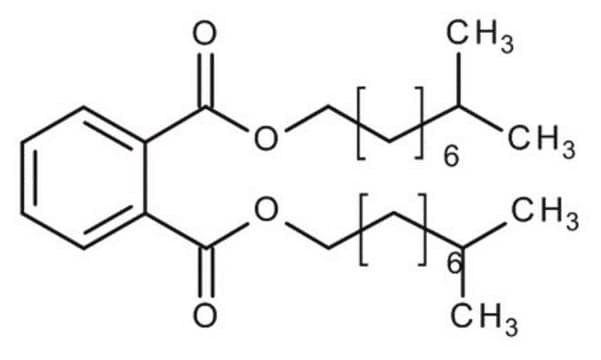Unfortunately, this product is intended for use in ion selective electrodes and is not certified or tested for use in DIN 75201 testing.
80135
Diisodecyl phthalate
for ion-selective electrodes, Selectophore™, ≥99.0%
About This Item
Recommended Products
grade
for ion-selective electrodes
Quality Level
product line
Selectophore™
Assay
≥99.0% (sum of isomers, GC)
≥99.0%
form
liquid
refractive index
n20/D 1.486
density
0.965 g/mL at 20 °C (lit.)
SMILES string
O=C(OCCCCCCCC(C)C)C1=C(C(OCCCCCCCC(C)C)=O)C=CC=C1
InChI
1S/C28H46O4/c1-23(2)17-11-7-5-9-15-21-31-27(29)25-19-13-14-20-26(25)28(30)32-22-16-10-6-8-12-18-24(3)4/h13-14,19-20,23-24H,5-12,15-18,21-22H2,1-4H3
InChI key
ZVFDTKUVRCTHQE-UHFFFAOYSA-N
Looking for similar products? Visit Product Comparison Guide
Related Categories
General description
Application
Legal Information
Hazard Statements
Precautionary Statements
Hazard Classifications
Aquatic Chronic 4
Storage Class Code
10 - Combustible liquids
WGK
WGK 1
Flash Point(F)
527.0 °F - closed cup
Flash Point(C)
275.00 °C - closed cup
Personal Protective Equipment
Choose from one of the most recent versions:
Already Own This Product?
Find documentation for the products that you have recently purchased in the Document Library.
Customers Also Viewed
-
Stehen auf der Flasche die Referenzwerte für DIN 75201 Verfahren A (Reflektometerwert) und Verfahren B (gravimetrischer Wert)? Gibt es ein Verfallsdatum?
1 answer-
Helpful?
-
Active Filters
Our team of scientists has experience in all areas of research including Life Science, Material Science, Chemical Synthesis, Chromatography, Analytical and many others.
Contact Technical Service







